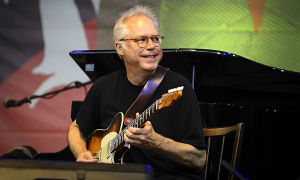Home » Jazz Articles » Touchstone Album Picks » Francesca Han: Exuding Honesty
Francesca Han: Exuding Honesty
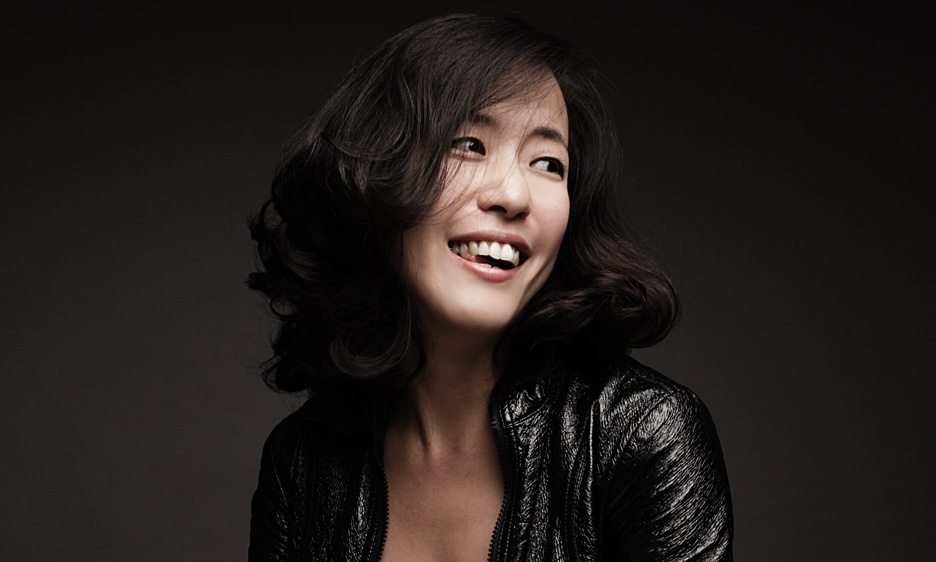
Courtesy Francesca Han
It is a lifelong journey to digest this instrument.
—Francesca Han
Classically trained, Han discovered jazz while studying in her native Seoul. It was a life-changing turning point that would lead her to New York, where she immersed herself in jazz studies both formal and informal. A number of excellent recordings followed, notably the quartet outing Illusion (NatSat Music, 2013) and the outstanding solo statement Ascetic (Audioguy, 2013).
After eight years in New York, Han returned to Korea, releasing a trio of albums that further cemented her reputation as a jazz artist of note. Her restless artistic nature would soon lead her to Japan and another musical adventure altogether. Home is currently France, where Han continues to catch the ear of discerning jazz critics on yet another continent.
Below are six albums chosen by Han that have influenced her musically in some way. In discussing their respective merits, the pianist throws light on what makes her tick as a musician, the importance of self-belief, and the need for beauty, courage and honesty in music-making.
 Bill Evans
Bill EvansYou Must Believe In Spring
(Warner Bros.)
1981, rec. 1977
All About Jazz: You could have picked a much more celebrated Bill Evans album, but nevertheless, this is a particularly beautiful performance by the pianist, bassist Eddie Gomez and drummer Eliot Zigmund. Why is this album important to you?
Francesca Han: This is actually the first jazz album I ever heard. I discovered jazz very late, in my third year at university. I was still playing classical piano and I played a composition of my friend, who is a classical composer, in a concert. He gave me this CD as a gift. At that time in Korea there was not really any jazz, just a few people who had come through Berklee. After listening to this album, I thought this was an extension of romantic classical music, though more innovative than classical music.
The most important element I found in Bill Evan's playing is the tone—the sound of the piano. His lyrical expression with a very calm tone, very softly played and not too complex. These were the elements I found most fascinating when I listened to this album for the first time. It was a completely different world after I discovered this album [laughs]. After that I listened to other Bill Evans albums, but this was a nice starting point.
AAJ: Bill Evans was pretty consistent, stylistically speaking, throughout his career—he never really followed any fads or adopted synthesizers or electronics. It was almost always just acoustic jazz. This is also true of your own music, up to this point; can you ever see yourself experimenting with electronics or elements of rock music, for example?
FH: I played rock music when I was young. Actually, at the time I listened to Bill Evans music I was playing keyboards in a rock band playing Deep Purple and Led Zeppelin—that kind of music. It was fun. While I was playing classical piano I was not really into the music because I could not change the notes—it was so strict for me. I wanted to create whatever I felt in the moment, and that's why I got it into my head to start playing jazz.
Day by day, year by year, I discovered more and more about the charms of the piano. Nowadays I play a lot of classical music at home, more than before [laughs], and I understand more the musical structure and the ideas of the composer. It is a lifelong journey to digest this instrument. If I want to play something well then I must control and know this instrument very well. There are tons of things to understand and to learn and to assimilate, not just the techniques. I prefer now to focus fully on this instrument, rather than experimenting with other keyboards.
AAJ: Bill Evans was very influenced by Bud Powell. Was Powell a pianist you listened to much?
FH: Yes, I listened to Bud Powell a little bit when I started playing jazz, but I was more into Wynton Kelly. I loved his tone. It was crystal clear and very warm as well. I love Bud Powell's music also. I transcribed his solos, but still sometimes his tone was too rough.
 Thelonious Monk
Thelonious MonkMonk's Dream
(Columbia)
1963
AAJ: This was Monk's first album for Columbia. A great line-up with Charlie Rouse on saxophone, John Ore on bass and Frankie Dunlop on drums. Tell us about your musical relationship to Monk?
FH: As you know, I discovered jazz by Bill Evans, and then Miles Davis. Later Bud Powell, Wynton Kelly, Keith Jarrett and of course John Coltrane, but Monk I discovered really late. I knew his compositions but there was something a bit weird about them—they weren't really accessible for me. I couldn't understand his particular way of playing. I really discovered him much later when I was in school in New York, around fifteen years ago. At the time I was listening to a lot of Jason Moran...
AAJ ... who gave you lessons, no?
FH: Yeah. He introduced me to Monk's music. I listened to Monk's music a lot then and played his compositions, because playing his music opens it so much. The real element of jazz is that we have to be creative, and innovative, like Monk or Miles Davis were. They created their own style. I really got into Monk's style and his music was a turning point, the sound, and the thinking process, the phrasing. Mostly, I think it was his compositional structures. I love his compositions, but "Monk's Dream" was really one I played a lot.
AAJ: Almost as absorbing as Monk soling is his comping. You hear his invention as an accompanist really well on this album. In fact, it's almost like he never really stops soloing, until he sits out.
FH: Yes! That's true. Then suddenly he just stops playing. It made me perplexed in the beginning. Is this possible? Is it wrong? You see on the videos that he starts dancing and then he comes back to playing. It was his style. To have an attitude like this you must have a very strong center, a very strong belief in yourself. I love his character.
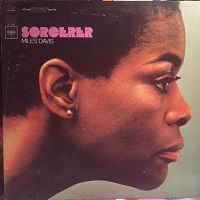 Miles Davis
Miles DavisSorcerer
(Columbia)
1967
AAJ: This is the third album of the six recorded by Miles Davis' so-called second great quintet. Why did you pick this particular album?
FH: There were a bunch of albums that I could have chosen but for me it is really the best. Nearly all the compositions were written by Wayne Shorter. I love that Miles Davis was not afraid of anything. He was very innovative. It's not just about the notes pouring from the instrument. You have to be selective. When I walk on the street I can recall some of Miles's phrases from his solos. He's playing very beautiful lines and it really shook me up a lot. Where is it coming from? How did he create such a line all of sudden?
He understands how to use energy and space, with not many notes. He was a master of phrasing. On this album he plays so beautifully, so perfectly, particularly on "Prince of Darkness." It hit me very hard.
AAJ: Nearly all those tunes were recorded in May 1967, except for the last track on the album, the vocal ballad "Nothing Like You," sung by Bob Dorough and recorded in 1962. It has always struck me as jarring, in the context of the album a whole, and a very odd inclusion indeed—almost an error of programming. What do you make of it?
FH: The first time that I listened to this album I wondered if this was a sort of a joke, or was it put there by mistake. Yeah, the same reaction as you. I am sure he explained it somewhere, but with all this serious music going on and then to finish up with this soft but very slick voice. It is very unlike Miles Davis. But I also enjoyed it later on.
AAJ: You recorded an album of vocal jazz standards with the veteran Korean singer Park Sung Yeon, Body and Soul, which came out on Audioguy Records in 2015. She was an important jazz figure in Korea, wasn't she?
FH: Yes. She was the first jazz generation in Korea. She was one of the first jazz singers. She also had the first jazz club in Korea, in 1978. It was a very beautiful jazz club, and she was the owner until she was hospitalized in her last years. She had dialysis for almost thirty years. She was struggling.
She never got married. She completely devoted her entire life to this jazz club, to keep it alive. There are a lot of jazz clubs these days in Korea, you could call it a kind of a boom, but at the time hers was the only one open to young musicians and old musicians. She was like a big mother to all the jazz musicians. We all appreciated her for keeping this place alive.
AAJ: Did you play there much when you were coming up as a jazz musician?
FH: Yes. It's called Janus. The first jazz club I ever played in was Janus. She was this figure... if you played there you must play with her. She might stop you if you didn't play correctly [laughs]. I was a little scared of course [laughs], but she liked the way I played, and we became quite good friends. Then I left for New York. She visited me a few times and we went to all the jazz clubs—two or three gigs per day, in Harlem and Downtown. I had a really amazing time with her, and she took care of me well.
AAJ: It must have been satisfying to record with Park Sung Yeon, to have this document of this important jazz figure in Korea, and of your musical relationship together.
FH: Yes. Unfortunately, she doesn't have many albums, I think four or five, so I was very happy to make this album with her. I can remember her forever.
AAJ: She made some great sacrifices to keep that jazz club alive...
FH: She sold the family house, I think, and all her LP collection. The sound system and piano in Janus were sponsored but the club rent was too expensive. She had to move out and open a smaller jazz club in a different area, but also still very expensive.
AAJ: Janus is still going today, isn't it?
FH: Yes, while she was in hospital she handed it over to another singer. It continues.
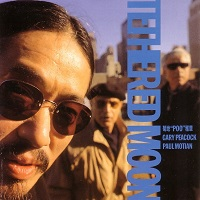 (Masabumi Kikuchi)
(Masabumi Kikuchi)Tethered Moon
(Evidence)
1993, rec. 1991
AAJ: Masabumi Kikuchi was a truly great pianist who played with a lot of amazing musicians over a fifty-year career. He made half a dozen albums with this Tethered Moon trio of Paul Motian and Gary Peacock; why did you choose this one?
FH: I saw him playing live only one time. It was 2011, just before I left New York for Korea. The gig was at the Village Vanguard. It was Paul Motian's Trio 2000+2—the groups' name was like that—it was Masabumi Kikuchi on piano, the bassists were Thomas Morgan plus Ben Street and the saxophonist was Loren Stillman.
I had never heard of Masabumi Kikuchi before, but I wanted to see Paul Motian and that's when I discovered him, fortunately. He played the ballad "Last Night When We Were Young," and wow! In my entire life, in my concert experiences... I cried like crazy! It was very special, very touching. He makes some weird sounds when he plays ....
AAJ: Yes, he sort of sang in a way similar to Keith Jarrett, though Kikuchi manages to sound like a tortured cat.
FH: A tortured sound, yes. It bothered me at the beginning, but his approach to phrasing, his emotion and his way of controlling emotion with space —all these things... it was really overwhelmingly beautiful. I couldn't believe what I was listening to. After that I started to discover his music.
His albums were very interesting, even when he was very young. He played with a lot of musicians, even Elvin Jones, I think they had a trio in Tokyo.
AAJ: He played with lots of big names—Joe Henderson, Charles Mingus, Sonny Rollins, Mal Waldron, Helen Merrill ...
FH: A bunch of major musicians. He studied with Gil Evans and he recorded something with Miles Davis... it was never released. Paul Bley was a big influence on his music. He was a master at making very sad, beautiful sounds.
AAJ: Agreed. This Tethered Moon album is beautiful, as is Kikuchi's playing, particularly on the original compositions which unfold like a magical suite.
FH: He has very clear lines. He has his own style and he believes in it. You can hear that in his music, which is always a good reference for us.
AAJ: It was a very interesting trio, Tethered Moon. I think they recorded six or seven albums over a dozen years or so, but it was the range of the musical inspiration—jazz standards, open-ended originals and then entire albums dedicated to the music of Jimi Hendrix, Edith Piaf and the arias from Giacomo Puccini's Tosca. Pretty extraordinary really.
FH: Absolutely.
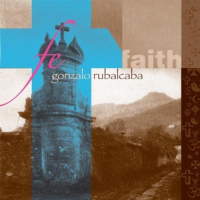 Gonzalo Rubalcaba
Gonzalo RubalcabaFe Faith
(5Passion)
2011
AAJ: Another interesting selection, a solo album from the great Cuban virtuoso, Gonzalo Rubalcaba. But this is unlike anything that Rubalcaba had ever recorded before, or maybe since...
FH: Since I started listening to music, and until now, I like the pianists who can really control well, control their emotions and technique, playing effortlessly but beautiful music. I don't know that I liked his music before because I found it so complicated, so dense, too busy, too many notes. It made me a bit tired when I listened to him. But with this album something changed... he is more expressive. I feel like maybe something changed in his life.
AAJ: It is a very personal sounding album. You have those three beautiful tunes dedicated to his children. Also, just the fact that it is a solo album surely changes things a lot. When you made your solo album, Ascetic (Audioguy, 2013), a wonderful album, I mean, it is a different mindset compared to when you play or record with any of your trios, no?
FH: Yes it is, completely. You are creating everything and controlling everything as well. It's just you, so you feel, wow, I can do whatever I want! [laughs] Rubalcaba's album was so perfect, but different from before—so personal and more honest, I would say. It was as if he was comforting himself. And comforting the listener. I really felt that, especially on "Blue in Green." He plays that twice, and both times I was very touched.
AAJ: Did you come across Fe Faith before recording your own solo album?
FH: Yes, about one year before. I had thought about maybe recording solo and this album gave me some ideas how to play solo, how to control things, technique-wise and energy. There are very practical reasons why I liked this album.
 Jason Moran
Jason MoranArtist In Residence
(Blue Note)
2006
AAJ: As always with Jason Moran, an interesting, multi-faceted album. What drew you to this?
FH: Jason was the last person I met in New York as a sort of mentor. I discovered him much earlier, of course, but I found it hard to get into at first. It was too free, a lot going on and then suddenly, boom! What is this? He's a fantastic musician, truly innovative.
I had lessons with him. It took almost one year to get lessons with him. We talked. It wasn't just about technique but the ideas that he had, which really influenced me a lot at that time, and until now, of course. He became a big figure for me. He opened up a lot of different doors for me, after I left New York, first in Korea and then in Tokyo, to play with various kinds of art forms—with artists, painters and installations. I had never really thought about these sorts of opportunities before. I only stayed in Korea for two and a half years before I left for Japan.
AAJ: Ralph Alessi plays on one track on this album. He is another important figure in your development, isn't he?
FH: Yes. I also had lessons with him. He was playing something different. The first lesson he brought just a very short phrase. He was like, 'Let's play!' There was no time. There were notes but there was no rhythm, no chord changes. That's how we started. Real improvisation. It really opened up so many possibilities, so many directions I could go in.
You know, sometimes we forget that jazz musicians in the beginning didn't play with chord changes, they always played by ear. There was no written music. Now, we are trained to become jazz musicians, which somehow doesn't make sense. An institution cannot teach people to become artists.
AAJ: I think a lot of people would agree with you. It's like a conversation with friends at a dinner table—you can't rehearse it or train for it...it comes from within.
FH: Yes, exactly. It already exists—all the notes and all the harmonies, we didn't create them. You need basic structure, to know how to put them together so they make sense, to make the conversation possible. You can't do that out of nothing. Everybody cannot just jump on the piano and play.
AAJ: These are six really interesting albums, Francesca, on lots of different levels. Is there a common denominator between them, for you?
FH: I think it's honesty. All the musicians were honest with themselves, and it makes for beautiful music. It's not about the level of technique, but how much we can express as human beings. Honesty is the key.
Tags
Touchstone Album Picks
Francesca Han
Ian Patterson
Ralph Alessi
eddie gomez
Eliot Zigmund
Bud Powell
Wynton Kelly
Charlie Rouse
John Ore
Frankie Dunlop
Miles Davis
Keith Jarrett
John Coltrane
jason moran
Wayne Shorter
Bob Dorough
Paul Motian
Gary Peacock
Thomas Morgan
Ben Street
Loren Stillman
Elvin Jones
Joe Henderson
Charles Mingus
Mal Waldron
Helen Merrill
Gil Evans
Paul Bley
Jimi Hendrix
PREVIOUS / NEXT
Support All About Jazz
 All About Jazz has been a pillar of jazz since 1995, championing it as an art form and, more importantly, supporting the musicians who make it. Our enduring commitment has made "AAJ" one of the most culturally important websites of its kind, read by hundreds of thousands of fans, musicians and industry figures every month.
All About Jazz has been a pillar of jazz since 1995, championing it as an art form and, more importantly, supporting the musicians who make it. Our enduring commitment has made "AAJ" one of the most culturally important websites of its kind, read by hundreds of thousands of fans, musicians and industry figures every month.












